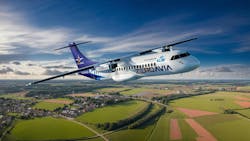ZeroAvia, KLM Plan demonstration flight using hydrogen-electric engines
FARNBOROUGH, U.K.- ZeroAvia and KLM Royal Dutch Airlines announced plans for a demonstration flight using ZeroAvia’s ZA2000 hydrogen-electric engines for large regional turboprop aircraft.
Hydrogen-electric engines generate electricity using hydrogen in fuel cells, powering electric motors to turn the aircraft’s propellers. The only emission is water vapor, potentially reducing climate impact by up to 90% compared to kerosene-fueled flights.
The companies aim to conduct an initial flight demonstration between two airports in 2026. Immediate tasks include selecting the airport pair, securing regulatory permits, ensuring the supply of liquid hydrogen fuel, and establishing fueling infrastructure.
ZeroAvia has tested its ZA600-engine prototype on a Dornier 228 aircraft in the UK and performed advanced ground tests in the US and UK for the ZA2000 system. The ZA2000 will support up to 80-seat regional turboprop aircraft such as the ATR72 or the Dash 8 400.
“KLM aims to be a front-runner in the journey towards a more sustainable future in aviation. That’s why we actively support and encourage innovation to drive industry change. When it comes to the future of zero-emission flights, KLM supports various technologies and innovations simultaneously. Together with our sector partners, we are conducting research on electric, hydrogen, and hybrid-powered flights and exploring ways to expedite these advancements,” said Maarten Koopmans, Managing Director of KLM Cityhopper.
“The world’s largest airlines are diving in to explore hydrogen-electric as a potential solution with increasing seriousness. We can’t wait to work with KLM, being an airline with such rich history, as we look towards a clean future for the industry,” said James Peck, Chief Customer Officer of ZeroAvia.
